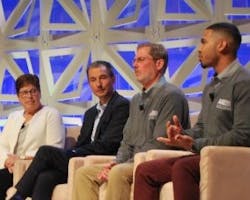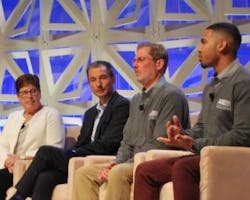Manufacturing academy on verge of 100th veteran graduate
Both new employers and veteran graduates attested to the valuable work of the Academy of Advanced Manufacturing. From left to right: Ann Hansen HR manager at Federal Mogul; David Musto, CEO of Thermo Systems; armed forces veterans and recent AAM grads Scott Bingham and Ryan Clouse.
Graduates of the Academy of Advanced Manufacturing (AAM) and companies that hired the U.S. military veterans who completed the program shared perspectives on the impact of this ground-breaking program as its first year comes to a close at the Automation Perspectives media event in Philadelphia. The academy provides a path for veterans to leverage the technical expertise gained during their tenures in the military and continue their journeys in careers that help to address the critical skills gap in advanced manufacturing.
As of November 2018, nearly 100 veterans have graduated from the academy and embarked on new careers with companies across the United States. The goal is to put 1,000 veterans per year through the program by 2020.
Over the past year, Rockwell Automation proved the academy curriculum works. People learn the skills they need, and it's flexible enough to adjust its technical and professional skills curriculum to include the things to make a veteran’s experience in the academy the best it can be.
A lot of veterans find that, after the service, their technical skills don't really translate into civilian jobs. Some do okay, but many have nowhere to go. This program in industrial automation and controls seemed too good to be true to some of the veterans. The AAM program basically takes four to six months of training and compresses it into three. It's intense and challenging, and the program will just keep getting better.
Cultivating talent
"It's a special thing that Rockwell is doing for veterans," said Joe Allie, director, global competency, at Rockwell Automation. "Not only is it producing advanced automation technicians by taking veterans that performed technical roles in the military and ‘upskilling’ them to be capable of working in a very technical, highly automated environment, it's also creating future supervisors and managers on the production floor, and they are all needed to fill the skills gap many manufacturers are experiencing."
Allie also led a panel comprising graduates and manufacturers. Ann Hansen, human resource manager at Federal Mogul, brought a graduate of the program into her organization, and she talked about the time it takes to fill technical roles in her organization and the challenges.
"Not only is it critical to find someone with the right skill set, but it must be someone who fits with our company culture," she said. "On average it takes about 13 months to fill those positions with the right people. It's a combination between the unemployment rate being at record low and that we are not seeing people enter into these technical jobs. There is more demand than there is supply, and it creates a long runway to get the people we want."
Allie asked David Musto, president and CEO at Thermo Systems, a control system integrator, if it takes 13 months to bring someone into his organization, what are the other costs? "It's not just a financial cost," said Musto. "It impacts our customers because, without the resources available, you cannot properly service the customer. There is also negative impact on your existing team. If you are not well staffed, it's bad for morale, and it's bad for the culture."
A worthwhile pursuit
Both Federal Mogul and Thermo Systems have invested in the AAM, and they offered some advice. "Working with AAM was a strategic advantage for us,” said Hansen. “We weren't sure it would work the way we had hoped, but it has been a good learning curve for us and gave us a great opportunity. It saves us time in recruiting and prescreens candidates with excellent results."
Scott Bingham, an AAM graduate and senior automation technician at Southwire, commented that the program offered him an opportunity that he would not have had anywhere else. “When I entered the program and saw what Rockwell was doing for veterans—giving them opportunities and changing their careers—I knew I was in the right place," he said.
Ryan Clouse, a recent AAM graduate and automation specialist at Rexel, was looking for an opportunity to use his skills as a radio repair technician that he’d learned in the military. "I found there were not a lot of direct opportunities for veterans, even if you held a highly technical position in the military," he said. But Rockwell provided an opportunity.
“Manufacturing is great, making things is great, but to have a visible impact on someone's life, especially a veteran coming in with a minimum-wage job, is a big deal,” explained Clouse. "Veterans are coming in with a minimum-wage job and are leaving with a high-paying salary. I'm in a role that normally requires an electrical engineering degree. This program is changing families’ lives. To everyone at AAM who is at the forefront of this program, I say, ‘Thank you.’ And don't lose sight of how much you are impacting veterans in a positive way."
Rockwell Automation is an organization that builds partnerships. "We are fortunate to work with two partners to make AAM successful," said Allie. "ManpowerGroup is a lead partner and is every bit as vested into AAM as Rockwell. In addition to that, Endress+Hauser brings the instrumentation training that allows us to offer that certification, as well."
The editors of Control are on-site at Automation Fair 2018 to bring you breaking news, innovations and insights from the event. Once the event is over, they will put together a report featuring the top news. Pre-order your copy today.



